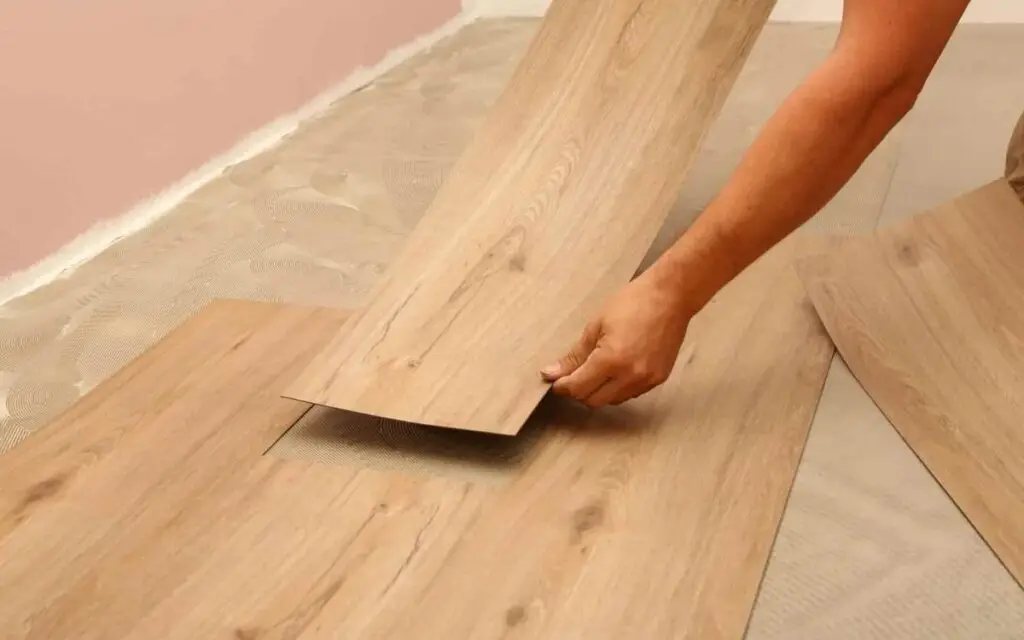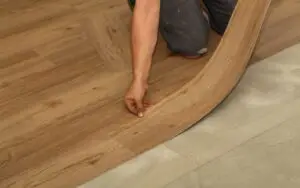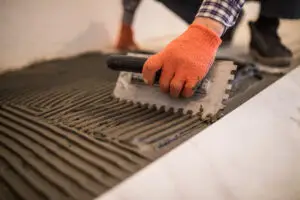Understanding DIY Flooring Installation
What DIY Flooring Installation Entails
DIY flooring installation involves undertaking the entire process of installing new flooring yourself, rather than hiring a professional. This includes all steps, from planning, preparing the subfloor, and material selection, to the actual installation and finishing touches. DIY flooring installation requires knowledge, skill, time, and the right tools, and many homeowners think it’s a great way to save money, but they don’t always consider the risks and challenges involved. Therefore, a complete understanding of all these aspects is essential to making an informed decision.
The Appeal of DIY Projects
The appeal of DIY projects lies in the potential for cost savings, the sense of accomplishment, and the flexibility it allows in terms of scheduling. Many people find joy in hands-on projects and they appreciate the opportunity to personalize their living spaces. However, it’s also important to consider all of the challenges and potential risks of a DIY project before starting, as this will help you decide if you are truly prepared for it.
The Potential Benefits of DIY Flooring
Cost Savings on Labor
One of the main attractions of DIY flooring is the potential to save money on labor costs. Professional installers charge a labor fee, and by doing the work yourself, you can avoid this expense, which might make DIY look like an enticing option. However, it’s essential to consider that DIY projects also come with other costs, which might end up surpassing the initial savings, so carefully planning everything is always a key element.
Sense of Accomplishment
Completing a DIY flooring project can provide a great sense of accomplishment and pride, as it’s a great feeling to be able to transform a room with your own hands. It’s a creative and hands-on project, which many homeowners find rewarding and fun. However, it’s important to realistically evaluate your skills before starting a DIY flooring project, as this will help ensure you are truly able to take the project to a successful completion.
Flexible Schedule
DIY projects allow you to work on your own schedule, so you don’t have to depend on professional installers availability, and you can work at your own pace. This is particularly beneficial for those who have limited time or specific schedules. However, it’s important to also be realistic about the amount of time the project will take you, and also plan for any possible delays or unexpected issues that might arise.
The Drawbacks and Risks of DIY Flooring
Lack of Experience and Skills
One of the biggest drawbacks of DIY flooring is the lack of experience and skills. Flooring installation requires expertise and knowledge to be performed correctly, and even the smallest mistake can impact the overall result, leading to costly repairs and the need for a professional installer to come in to fix all the errors, which can end up costing you more money in the long run.
Time Commitment and Frustration
DIY flooring projects can be very time-consuming and frustrating, as they often require more time and effort than expected. Unexpected challenges can also arise, which can lead to delays, errors, and additional costs. Homeowners should always be prepared for these challenges, and also realistically evaluate if they have the time and patience for the tasks involved.
Potential for Costly Mistakes
DIY flooring projects often involve costly mistakes, from improper subfloor preparation, to incorrect measurements or poor installation techniques, which can all result in wasted materials, damage to the flooring, and the need for professional help to correct all errors. These mistakes can often surpass the initial savings, making a professional installer the most cost effective solution overall.
Voiding Warranties and Guarantees
DIY flooring installation can void the manufacturer’s warranty if the flooring is not installed according to the specific guidelines. This can leave homeowners responsible for any problems that may arise due to improper installation, while also nullifying any guarantees that might be available. Professional installers are familiar with all the manufacturer’s instructions, and they can guarantee that your new floors will be installed correctly, while also protecting your investment.
The Advantages of Professional Flooring Installation
Expertise and Precision
Professional flooring installers have the expertise and precision to ensure that your flooring is installed correctly, and they will also ensure that every step of the process is done with care and attention to detail. They have the knowledge to address any challenges that might arise, and they will also ensure a flawless installation that is both beautiful and durable.
Access to Professional Tools and Equipment
Professional installers have access to specialized tools and equipment that are necessary for proper flooring installation. These tools ensure efficiency, precision, and a professional outcome that DIYers usually lack, which is a key part of why a professional installation will always look better than a DIY installation, and also be more durable.
Time Efficiency and Project Management
Professional installers work efficiently and manage all aspects of the flooring project, which reduces the time and effort required from the homeowner. They will also take care of all the planning and scheduling, ensuring the project is completed on time and within budget. This can save you significant time and hassle, as you don’t have to deal with any part of the project, and you can have peace of mind, knowing that your floor is being installed with care and precision.
Warranty and Guarantee Coverage
Professional installers often provide warranty and guarantee coverage for their work. This protects your investment, giving you peace of mind, knowing that any issues that might arise in the future will be taken care of, without you having to pay any additional costs, and this is a great advantage of choosing a professional installation.
A Detailed Comparison: DIY vs. Professional Installation
Initial Cost vs. Long-Term Value
While DIY installation may have a lower initial cost, professional installation can often provide greater long-term value. Professional work guarantees a durable and long-lasting result, which will minimize future issues and expenses. Therefore, it’s essential to carefully consider all the potential costs, not just the initial price.
Time and Effort vs. Convenience
DIY installation requires a significant investment of time and effort, while professional installation provides greater convenience. Professionals take care of all aspects of the project from start to finish, which saves you the hassle and headaches that often come with DIY jobs. This convenience is a key factor that you should always consider before undertaking a DIY project.
Quality of Installation and Durability
Professional installation generally offers superior quality and durability compared to DIY attempts. Professionals have years of experience and the necessary skills and tools to ensure a flawless and long-lasting result, while minimizing mistakes, and ensuring all the correct steps are taken to guarantee a perfect floor that you will love.
Addressing Potential Issues and Repairs
Professional installers are better equipped to address any unexpected issues or repairs that may arise during the installation process. They have the knowledge and experience to quickly and effectively resolve any problems, while also minimizing the impact on the project timeline, which is a key advantage when compared to DIY installation.
Factors to Consider Before Choosing DIY
Your Skill Level and Experience
Before choosing a DIY approach, carefully evaluate your skill level and experience in home improvement projects. If you have limited experience, it’s important to honestly assess your abilities and recognize that you might be better off choosing a professional installation, rather than risking a low quality DIY job.
The Complexity of the Flooring Project
The complexity of the flooring project can also affect your decision. Simple, straightforward installations may be suitable for DIY, while more complex projects with difficult layouts, or uneven subfloors are better left to professionals who can ensure a high quality result with all of their skills and expertise.
The Type of Flooring Material
The type of flooring material also matters. Hardwood and tile installations require specialized knowledge and skills, while vinyl plank and laminate may seem easier, but they also require careful preparation and precise work to guarantee a long-lasting and stable result, and professional installers are always your safest bet when dealing with any type of flooring material.
Your Personal Time Constraints
If you have limited time available, DIY flooring installation may not be the best choice, as these projects often take much longer than expected, and they require a lot of planning, preparation, and attention to detail, which can be a problem for those who have limited time and are not available to work on a project full time. Professional installers can complete the job quickly, and they can also work around your schedule.
When Professional Installation is Recommended
Complex or Large-Scale Projects
Complex or large scale projects, such as large homes, or those that involve intricate designs are usually better left to professional installers, who are familiar with these complex projects and have the expertise to tackle them quickly and efficiently, guaranteeing a beautiful and flawless final result.
High-Value or Delicate Flooring Materials
When dealing with high-value or delicate flooring materials, such as high-end hardwood or natural stone, it is best to rely on professional installers, who have the knowledge and expertise to handle these materials properly, while also preventing costly mistakes and ensuring that the installation is done with the best techniques and the best care.
When Warranty Coverage is Crucial
If you want to make sure that your new flooring is covered by a warranty, it’s always best to choose a professional installation, as this often guarantees that you won’t void the manufacturer’s warranty, which might happen if the job is done incorrectly, by a DIY installer. Professional services guarantee the work and guarantee that the manufacturer’s warranty is still valid.
If You Lack the Necessary Skills or Tools
If you lack the necessary skills or tools, it is always best to hire a professional for your flooring installation, as this will ensure you get the best possible outcome for your new floors, while avoiding costly errors and frustration. Professionals have years of experience and are well equipped for this type of work, which guarantees a beautiful, long lasting result, and also protects your investment.
FAQs & Answers
Common DIY flooring installation mistakes include not properly preparing the subfloor, inaccurate measurements that lead to wasted materials, incorrect cuts, poor alignment, and improper installation of the underlayment or moisture barrier. These mistakes can compromise the integrity and lifespan of the new floor, and often end up costing more to correct. Professional installers are trained to avoid these errors, which guarantees a flawless result and a high-quality and durable installation.
While you might save on labor costs with a DIY flooring installation, you also risk incurring unexpected expenses from mistakes, material waste, or the need to hire a professional to correct any issues. Professional installers provide a detailed quote up front, which guarantees that you will stay on budget, and also gives you peace of mind, knowing that your floor will be installed perfectly and without any mistakes. Therefore, DIY is not always the most cost-effective solution.
A DIY flooring installation project can take significantly longer than a professional installation, as it can be very time-consuming, especially if you have no prior experience. You might also run into unexpected issues, which will add extra time to the job, causing frustration and delays. Professional installers complete the work much more efficiently, due to their experience and knowledge, and can finish in a fraction of the time it would take a DIY installer.
Yes, DIY flooring installation can void the manufacturer's warranty if not performed according to specific guidelines. Manufacturers often require that their flooring products be installed by qualified professionals to guarantee coverage. Professional installers are familiar with the manufacturer's guidelines and will ensure that your installation does not void any warranty, giving you peace of mind, and making it a worthwhile investment.
Professional flooring installation is often a better choice because it guarantees a high-quality and durable result, performed with expertise, skill, and precision. Professionals not only provide a long lasting installation, but they also have the tools and experience to tackle even the most complex installations, ensuring all the necessary steps are taken to create a flawless floor. Choosing a professional gives you peace of mind, knowing your floor will look its best and will last for many years to come.





